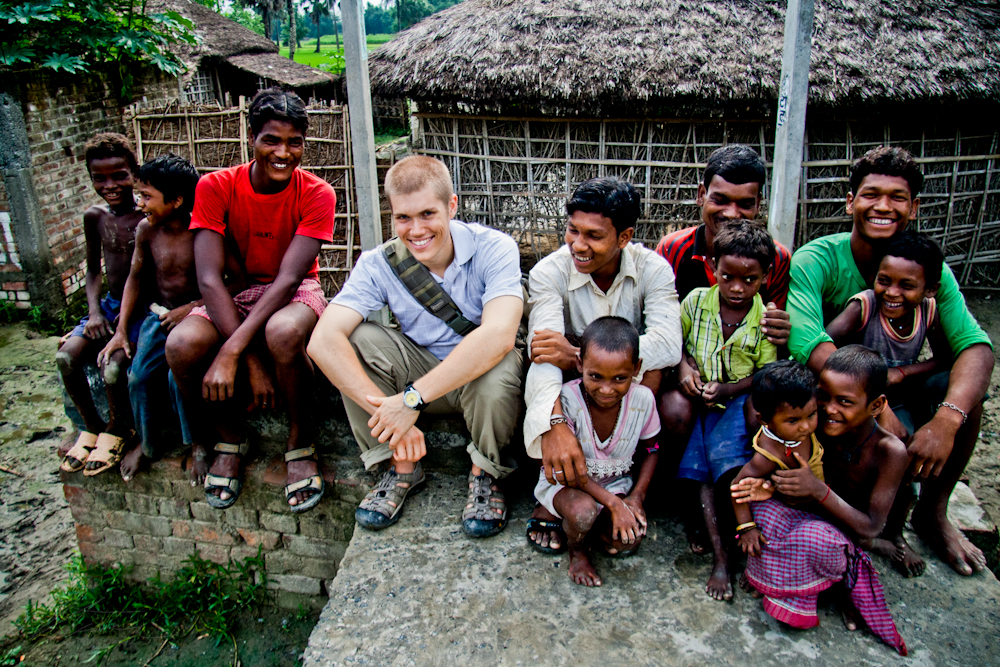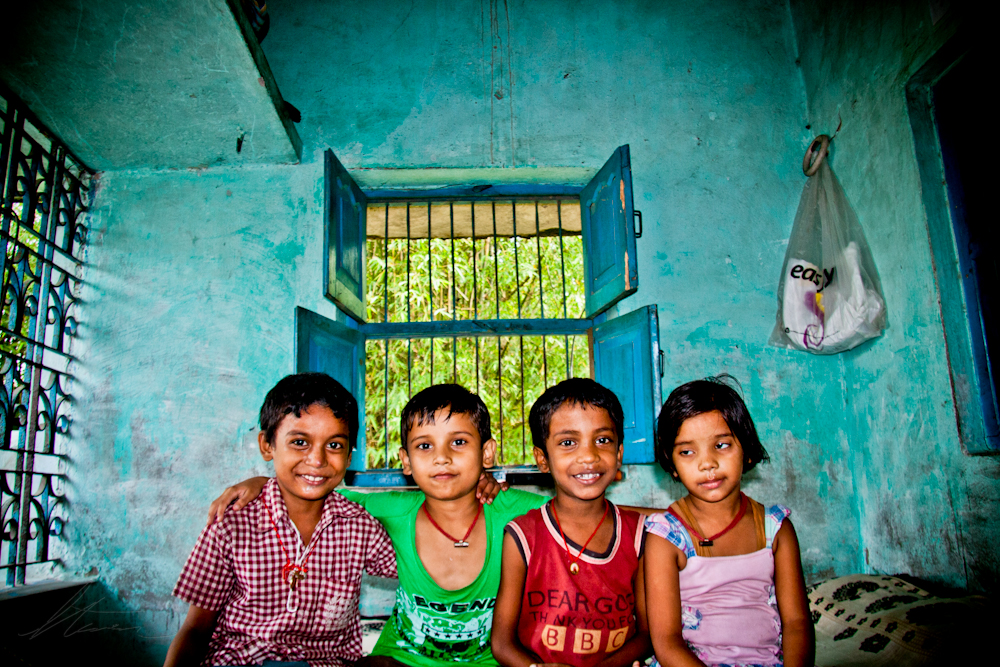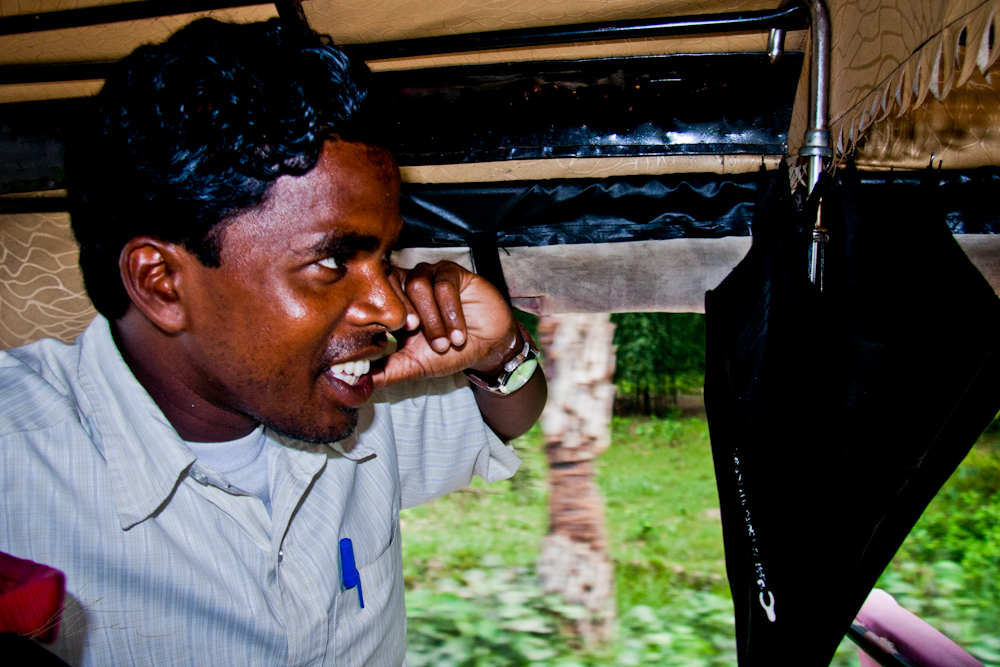
Travel Blog: Buying a train ticket and one more village visit....
India, Day 10
 I had a good times with my host in the area where I stayed in India from days 5-10. But, all good things must come to an end. The end would arrive with a much more pronounced snap than I originally expected, as will be detailed tomorrow...
I had a good times with my host in the area where I stayed in India from days 5-10. But, all good things must come to an end. The end would arrive with a much more pronounced snap than I originally expected, as will be detailed tomorrow...
This day, however, was spent in a 40km trip to the nearest big town where we bought train tickets for the next day's journey southward. Our trip to the train station almost became a debacle, though, because I had yet to learn how train travel works in India. During the middle part of the year, when most of the people in India do their work or leisure traveling, tickets are booked as long as six months in advance. Whenever anyone tries to book a ticket for next-day, or even next-month travel during the busy season, the best you can manage is a situation similar to flying standby: you are on the list, but not guaranteed a seat. And given the nature of Indian trains, there isn't always room to stand either...
I didn't learn any of this until the moment we walked into the ticket office to purchase our tickets. To the Indian culture, this is natural. To the western mindset, I couldn't understand why my host, with the knowledge of my visit, didn't book the tickets three months prior. Cultural differences, I suppose.
At any rate, our two-hour tempo ride home was punctuated by one last visit to some of the local gypsies. And, again, I was impressed by my host's fearlessness at walking into a clump of buildings and assembling a crowd from what seemed like nowhere, and we would speak to them.
Whenever I travel through India, people always ask me if it's "safe" to go to remote places to speak to the villagers. My opinion on this subject is colored a bit, because a)I loath crowded cities and love small towns and villages, and b)I was introduced to India by fearless people who taught me to be careful, but never to be fearful. And when I was in India on my own, I stayed with hosts who also exhibited no fear. And as for the people we spoke to, their response was never anything but perfect hospitality. The Indian attitude toward most encounters is to be polite and always non-confrontational, and visitors have to be extremely offensive and abrasive to raise their ire. With these factors all in play, I'm never worried.
My biggest danger in India turned out to be...myself. Come back tomorrow for the full story on how I woke up blind the next morning...
Special Deal!
Good morning everybody! I have a special offer for your weekend: a 12"x18" print of a photo I took in India earlier this year (not my most recent trip, but the one previous). This print, simply titled "Making Chapati," is an authentic cultural snapshot; a capture of two women making traditional Indian flatbread (chapati) in a rural village.
It is printed on metallic paper, which brings out the crisp B&W contrast. I originally ordered it for presentation in a photography show, but circumstances prevented me from ever entering.
If you would like this print, or know someone who would, I am letting it go for $25.
Email steven@stevengrayphotography.com.
Why India?
I've had a lot on my mind as I prepare for this summer's adventure.
Very soon, I will depart for India, where I will spend the rest of the summer working with Indian pastors across the country in their respective ministries. Unlike my previous trips to India, I will not be traveling with a group of people, but will be going there alone and staying with host families until the final week, at which time I will meet up with some dear friends for a medical outreach. At the moment, life feels a bit purgatorial as I refrain from starting new projects and basically kill time before wheels up.
Am I nervous at the prospect of going solo to dive into the frenetic country of India?
Yes and no. I don’t relish the twenty-hour (including layovers) airline journey from Florida to India. I have plenty of reading material ready for the trip, but it is still going to be a devastatingly quiet trip without any traveling companions.
But actually being in India again, doing work that is truly meaningful, is a prospect which I am greatly looking forward to. I am never as confident in my purpose in life as when I am ministering in India.
People often ask me why I feel the need to go as far as India to share the gospel. And, honestly, I’m still not sure how to respond sometimes, because there are a lot of reasons why I feel I need to go to India. A major reason for this is that I can’t think of any institution outside of the Christian church that goes into India to reach out, form individual relationships and provide relief.
The biggest reason I can think of, though, is that India not only needs the gospel, India is hungry for it. India has been under the rule of the caste system for so long that the freedom of thought and spiritual uplift offered by the gospel is a deeply moving concept, and one which they are eager to share with their friends and families.
It’s funny, really. If you had come up to me three years ago and told me that I would spend two consecutive New Years in India, and would even go so far as to devote an entire summer to an epic missionary journey across the country, I would have laughed at the idea. Not out of scorn, but out of sheer disbelief.
Me, go to India? Why?
My first trip to India began in a picaresque way. I logged into Facebook one day and found the following message waiting for me. It was from a good friend who had already been to India for missions work the year before:
Find your passport
Need you to go on an expedition with us, December XX- January XX, to India to deliver the Christmas backpacks. Need someone who is not afraid of travel, weird food, sketchy legal situations, and who is strong as a horse. This is not missionary tourism. This is the real deal. You in?
How could I turn down an invitation like that? It was a classic "offer I can't refuse," worded in exactly the sort of terms that I respond to favorably.
The trip was every bit the adventure the message hinted at it being. But it was also the start of something bigger.
Prior to India, I had traveled, but never with the kind of purpose provided by ministry. Stepping off of the plane into India was like leaping into a snowbank after languishing in a warm sauna all my life. For the first time in my life, I saw real poverty among real people. Not from a distance--it wasn’t a documentary or a movie--I was overwhelmed, overstimulated and in the middle of everything. It changed the way I looked at the world; it made me fully cognizant of the freedom and sheer number of choices I had always enjoyed in the States without even knowing I had them.
 But my experience wasn’t limited to observations on third-world living conditions. India re-introduced me to all that is good in the human spirit. Most of the people of India seem blissfully unaware of their poverty. It is simply their way of life, and as such, they greet visitors with the biggest smiles and the warmest welcomes I have ever seen. The Indian people are kind in the extreme, and their beauty of spirit is exponentially magnified when touched by the love of Christ.
But my experience wasn’t limited to observations on third-world living conditions. India re-introduced me to all that is good in the human spirit. Most of the people of India seem blissfully unaware of their poverty. It is simply their way of life, and as such, they greet visitors with the biggest smiles and the warmest welcomes I have ever seen. The Indian people are kind in the extreme, and their beauty of spirit is exponentially magnified when touched by the love of Christ.
My first trip to India was one of culture shock. So much was new and different that I was glad for the relief of coming home. My second trip, however, was the opposite. I was prepared for India, and the culture shock hit home when I arrived back in the US. After barely more than a week in India, seeing beauty of soul in people who had next to nothing, I returned to the United States and was greeted by a spoiled culture of wealthy, overweight individuals who couldn’t make it from one gate to another in the airport without complaining the entire way. To make matters worse, I had school to return to at at the time, and could look forward to three months of busywork in the homestretch toward my diploma. I was experiencing reverse culture shock, and it made me angry. I wanted to go back to India at that moment.
And now, I want to go back to India because the work I have done there represents the only times in my life to date when I had complete and total confidence that I was doing was the right thing. When in India, I wake up every morning with the knowledge that the work I do each day is for God and will help others. It is a far cry from the standard-issue drudgery of the daily grind in America. It makes me question the core values of Western culture. For Christians, ministry and outreach should be action items every day, but we allow ourselves to get caught up in the tedium of everyday life, and outreach is pushed to the back burner, or even worse, it is viewed as something “for other people.”
Evangelism in its pure form, sharing the words and love of Christ, is not an option if you identify yourself as a Christian. Christians are, by definition, already called to share God’s love with the world. Not judge the world, not to scream at cars from street corners--to share love. It is a travesty that we allow our divine purpose in life to be relegated to a once-a-week event instead of daily practice.
In the end, I think that is why I love working in India so much. It is a complete and total separation from everything that I see as lopsided in American culture, and blocking out time to be totally removed from the obligations of home, work and school lets me experience the joy of full-time service.
I recently saw The Best Exotic Marigold Hotel. While the film’s depiction of India was a bit too clean to ring true, there was a very stirring line spoken by Tom Wilkinson that sums up my own feelings about India. Wilkinson’s character, Graham, is asked a pointed question by Jean, played by Penelope Wilton:
Jean: "How can you bear this country? What do you see that I don't?"
Graham: "The light, colors, the smiles, it teaches me something."
I have to agree.
Visual India
 Last weekend, I joined with some friends for a night of Indian food and a screening of the Criterion release of The Darjeeling Limited on blu-ray. It was a fun night all the way around.
Last weekend, I joined with some friends for a night of Indian food and a screening of the Criterion release of The Darjeeling Limited on blu-ray. It was a fun night all the way around.
After traveling to India several times, (always working, never for simple tourism), I've become very attached to Indian culture. I'm certainly not an expert, but I enjoy the food, the art, the history, and most of all, speaking with the people there. One is hard-pressed to find kinder, gentler and more interesting people than those who live in India.
India has become popular in America over the past few years. I think that mass notice of Bollywood and its surrounding culture has had something to do with that it. Personally, Bollywood song-and-dance films are [very] far from my favorite genre of cinema, but I do enjoy the energy they convey. India is incredibly well-suited for such an indigenous film industry, because the country is so amazingly visual.
The visual beauty of India almost belies the poverty and grittiness of what everyday life is really like there. The people are so colorfully arrayed, the landscape is so varied and the traditional architecture is so nuanced that it is harder to attain bad imagery than good imagery in such an environment.
I think that its sheer visual beauty has led to many Americans falling in love with the idea of India without ever facing the country itself. I said as much to a German backpacker I spoke to at the Delhi airport earlier this year. She was going home after several weeks in Goa, and she said to me "I don't see many Americans traveling in India. Why do you think that is?"
Given the amount of business we do in India, I was surprised that Americans seemed underrepresented in a vacation hotspot like Goa, but I could understand why, and said as much in my response.
"I think that most Americans like the idea of India--the colors and the food. They just aren't too crazy about the smell."
Possibly a harsh thing to say, but I still feel it to be true on principle. India is a shocking country to visit upon one's first arrival into a nation where the air smells like burning cow dung as much as it smells like cinnamon.
But the sheer beauty of the country, and the beauty of soul which shines out of the eyes of its people, will charm any visitor into submission. I was reminded of this while watching The Darjeeling Limited last night. It made me excited that Best Exotic Marigold Hotel opens in American theaters this week. It made me ecstatic to return to India myself later this year.
The beauty of India can almost be called a gateway drug to the culture. There is poetry in its harsh landscape and simple country dwellings. India's cultural fabric is a frenetic tapestry of crowded streets and heart-stopping traffic; shouts of the street vendors, passive-aggressive inquiries from beggars and blindingly white smiles from inquisitive children. The paradoxical contrast and cohesion of all these elements make it a country which lures in the curious and claims them for its own. Whether by force of charm or the underlying mystery which such a culture presents to outsiders, India is an experience.
The principal characters in The Darjeeling Limited are so representative of how visitors are affected by the country. That's one of the reasons why I love the film so much.
Francis (Owen Wilson) goes to "have an experience," but his purposeful strides from temple to temple, punctuated by side-trips for power adapters and painkillers hold him back from actually experiencing anything until he abandons his control issues by the end of the film..
Jack (Jason Schwartzman) distracts himself with his girlfriend in Europe and a temporary fling with a train attendant. He allows his more carnal impulses to distract him from the larger picture of what is going on around him. He allows the specific to totally detract from a full perspective.
And in the middle of it all is Peter (Adrien Brody), who seeks out novelties like a child, all the while resisting the responsibilities of being a father which await him at home. He matures by the end of the film, but one wonders how he ever expected to get a cobra through customs.
As an American, it is my responsibility to represent my country and my fellow Americans in a positive way. After all, we have set ourselves up as the guardians of world democracy, and it's the least we can do to be pleasant and teachable. We cannot allow inconvenience, different or expectation to hold us back from visiting countries like India.
The world is huge. Just think about it! Consider the varying climates and cultures in India, China, Egypt, Germany, Britain! And many people are content to spend their entire life living in one city, considering travel to be "for other people;" perhaps to be reserved as a reward given to one's self when too old to fully enjoy the experience.
Never settle for the sedentary life. The world is there for a reason. See it. And visit India first.














